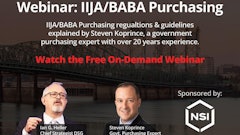The problem with being a business guru (albeit self-appointed) is that people sometimes pay far too much attention to what I have to say. Not those around me, like the wife or the kids or the dog. They don't pay any attention at all. I'm talking about strangers, who don't know any better.
Granted nowadays, we all need to be able to seize every good idea we can from whomever we might be able to seize it. But far too frequently, far too much of what's getting seized is absolute first-class dreck.
Guess what? You don't need to know what you're talking about to get your face on TV or your words plastered across the pages of some magazine. You don't need to know what you're talking about to get yourself up on stage, attached to a microphone, pontificating at some convention. I do it all the time and, while I always give it my best shot, any claims I might make about even approaching infallibility would immediately be hooted down by the wife. Or the kids. Or the dog.
What counts nowadays isn't what you have to say. What counts is that you say it in an attention getting way.
And when it comes to getting attention, there's nothing as effective as well thought out, well crafted dreck. And I'm not just talking about business gurus. I don't want to get into politics here, so let's use an example that's non-political. Let's use Rush Limbaugh.
Whether you buy into what Rush or similar gurus (on either the left or the right) are saying, we all realize that the wilder and the more extreme the statement from any of them, the greater the PR. The greater the PR, the higher the ratings, the greater the book sales, the bigger the contract.
By the way, I wasn't being sarcastic when I said that Rush Limbaugh was non-political. Rush Limbaugh is no more about politics than Madonna is about sex. It ain't so much the politics, baby, as it is the self-promotion.
Now if you're a fan of Rush's, you may be thinking that everything in those last three paragraphs is itself worthless dreck. And you may be right. But see how much more attention those extreme statements generated than if I'd just said "There might be times when Rush Limbaugh isn't entirely correct."
But let's get back to business gurus. How much of our economy is slave to the business or management guru of the month?
Stephen Covey is certainly one of our most successful business gurus, and quite possibly one of the best. The last I heard The Seven Habits of Highly Effective People had sold somewhere in the neighborhood13 million copies. At one point he was advising 82 of the top 100 companies in America on how to run their businesses. Then he teamed up with Hyrum W. Smith, the business guru who created the Franklin Day Planner. Who's also a best-selling author.
I mean, talk about guru wonderland: here's a guy who in the 1980s talked every yuppie in America into lugging around 40 pound appointment books that they had to take a course to use.
Covey and Smith said that they were going to apply their expertise to make their company a model for industry. According to BusinessWeek, "It turned out to be a model all right: of bloated bureaucracy, poor planning, and internal bickering, turning Franklin Covey Co. into a poster child for highly ineffective organizations." Apparently, Covey and Smith were removed from running their own organization.
It's easier to say than to do. Are you familiar with Weiler's Law? Weiler's Law says that nothing is impossible for those who don't have to do it themselves.
A few years back the business gurus at Fortune magazine awarded the coveted title of "Most Innovative Company in America" to...you guessed it, Enron. Hey, whatever else you might say about them, there's no denying they were innovative.
The original Success magazine was a publication chocked full of tips for success from all the country's leading business gurus. Until Success went out of business. I don't know if the advice wasn't any good or if they just weren't listening to their own gurus.
Of course this particular example is not one I can get all that cocky about, since yours truly was one of those self-appointed gurus. In fact, they still owe me for the last article I wrote for them. Obviously neither the article nor the advice in it did much for Success magazine. [As far as I know, the current magazine called Success has nothing to do with the old one. If is connected, I'd appreciate it if they'd send me my money.]
Question the best. Question authorities. Question the flavor of the month. Question me.
Question conventional thinking. Earl Nightingale said, "Whatever the majority of people is doing under any given circumstances, if you do the exact opposite, you will probably never make another mistake as long as you live."
Question conventional thinking. Question Earl.
Question accepted wisdom. Art Hammer is an idea expert. His company helps businesses generate, refine and test ideas for improving their processes. Art has empirically tested hundreds of thousands of ideas. Art says, "What we have consistently discovered is that whenever everyone involved unanimously agrees an idea is going to help, a quarter of the time it will improve results, half the time it will have no effect and a quarter of the time it will actually hurt."
Be your own guru. Then don't forget to question yourself.
Copyright 2007, Barry Maher, Barry Maher & Associates, Las Vegas, Nevada. Used by permission.
Barry Maher shoots off his mouth, consulting, writing and speaking on small business and contracting issues like communication, professional development, motivation, management and sales. His book, "Filling the Glass" was cited by Today's Librarian as "[One of] The Seven Essential Popular Business Books." To read more articles, sign up for his newsletter or contact him, visit his website at www.barrymaher.com.


























